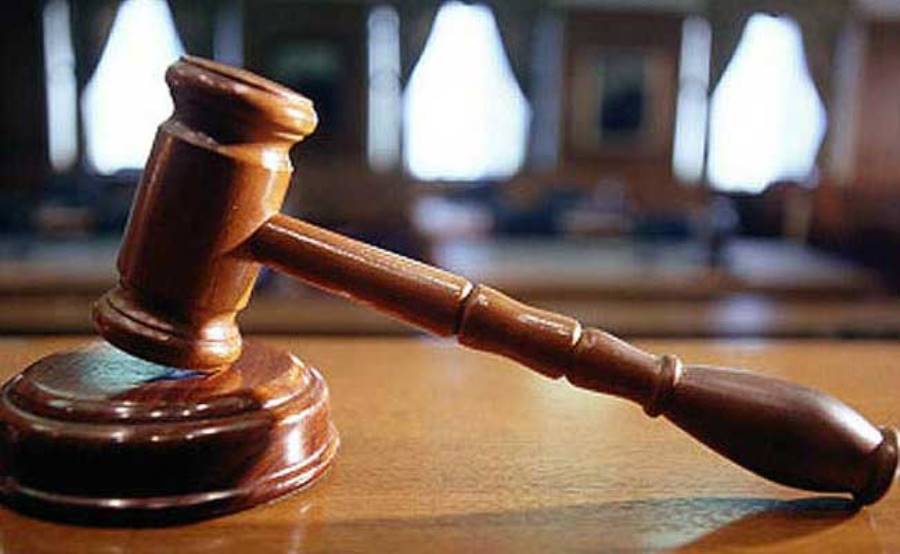Following a plea bargain okayed by the Economic and Financial Crimes Commission, EFCC, the Federal High Court in Abuja, Monday terminated further hearing on the money laundering charge against former Chief of Defence Staff, Air Chief Marshal Alex Badeh, retd, who was murdered on December 19, 2018.
However, the court, in a consent judgment delivered by trial Justice Okon Abang, convicted Badeh’s company, Iyalikam Nigeria Limited, which was charged as the 2nd defendant in the case.
The conviction followed admittance of guilt by the firm which had initially indicated its intention to file its defence to EFCC’s amended 14-count charge before the ex-CDS was shot dead along Keffi-Abuja expressway while returning from his farm.
Badeh, who, was alleged to have within 2013, diverted over N3. 9billion from account of the Nigerian Air Force, NAF, was killed shortly after he secured the nod of the court to open his defence to the charge.
EFCC alleged that the defendant used part of the fund to acquire choice properties within and outside the Federal Capital Territory.
The anti-graft agency had since closed its case after it produced a total of 22 witnesses that testified before the court, while Badeh who previously told the court that he would enter a no-case-submission in the matter, suddenly made a U-turn, informing the court of his decision to call witnesses and adduce evidence to establish his innocence.
He had on July 4, 2018, pleaded not guilty to the amended charge.
Before he terminated further hearing on the matter, Justice Abang, had directed that all properties that were seized from the 2nd defendant, Iyalkam Nigeria Limited, should be forfeited to the Federal Givernment through the EFCC.
Mr. Abang further ordered that the firm should be closed by the Corporate Affairs Commision, CAC, which he said should be served with a copy of the judgment.
According to the trial Judge: “Having regard to the plea bargain and plea duly taken, I hereby find the 2nd defendant Iyalikam Nigeria limited, guilty.
“The defendant is hereby wound up and this judgement shall be served on Corporate Affairs Commission(CAC) for necessary action.
“All properties in line with the 10-count charge are hereby forfeited to the Federal Republic of Nigeria through the Economic and Financial Crimes Commission(EFCC).
“In view of the fact that the first defendant in the original charge is reported dead, all charges against the first defendant are hereby terminated.”
EFCC had immediately the case was called up, notified the court that it had brokered a plea bargain deal with the defendant.
“My lord this case was adjourned to today for continuation of hearing, in particular for defence of the 2nd defendant since the 1st defendant is deceased.
“However, there is a development. The 2nd defendant and the prosecution have met and they have been able to reach an agreement, and we have filed a further amended charge dated March 1 and filed March 4.
“We also filed a plea bargain agreement dated March 4, pursuant to section 279 of ACJA, 2015”, EFCC’s lawyer, Mr. O. Atolagbe told the court.
Following a no objection stance by either Badeh’s lawyer, Chief Akinolu Olujimi, SAN, and that of the firm, Mr. Samuel Ologunorisa, Justice Abang ordered the firm to enter fresh plea to the further amended 10-count charge.
Relying on section 19 of the Money laundering Act, the court convicted the firm and ordered the CAC to wind it up.
One of the charges EFCC earlier preferred against the late CDS and his firm, read: “That you, Air Chief Marshal Alex S. Badeh (rtd) and Iyalikam Nigeria Limited on or about 24th February 2016 in Abuja within the jurisdiction of this Honourable Court, did retain possession of the sum of $1,000,000.00 only which you kept at No. 6 Ogun River Street, Off Danube Street, Maitama, Abuja which funds you reasonably ought to have known formed part of the proceed of your unlawful activity to wit: theft, criminal breach of trust or corruption and you thereby committed on offence contrary to Section 15 (2) (d) of the Money Laundering (Prohibition) Act 2011 as amended in 2012 and punishable under Section 15 (3) of the same Act.”

